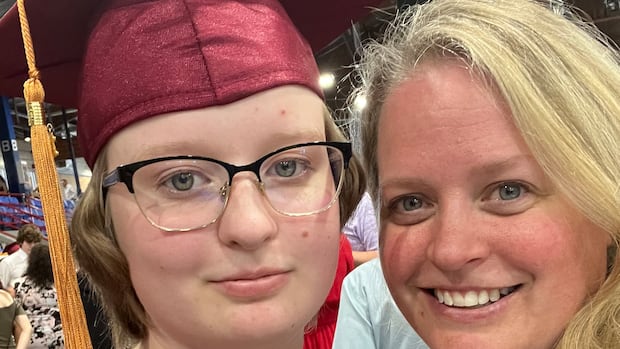British ColumbiaA Fort St. John mother who credits a local mental health program for saving her daughter’s life says funding cuts will leave vulnerable youth in crisis without critical in-person support once they leave the hospital.Northern Health recorded the highest suicide rate in B.C. among 9 to 18 year olds from 2019 to 2023Matt Preprost · CBC News · Posted: Oct 21, 2025 10:58 AM EDT | Last Updated: 3 hours agoFort St. John mother Leanne Couch, right, says she fears the cutting of a local mental health program will leave vulnerable youth, like her daughter was, at risk. (Submitted by Leanne Couch)A Fort St. John, B.C., mother who credits a local mental health program for saving her daughter’s life says funding cuts will leave vulnerable youth in crisis without critical in-person support once they leave the hospital.Saplings Mental Health has been providing community-based outpatient services through emergency room referrals over the last four years, offering immediate access to psychiatric care, counselling, programming and supports for parents. But with funding for it now coming to an end, the in-person service is being replaced by a virtual one. Northern Health says a new regional support team will provide “virtual assistance to emergency departments” for youth and families experiencing mental health and substance use crises.Leanne Couch, a mother and former nurse at the Fort St. John hospital who now teaches at the local college, warns the decision could be harmful.“We need to keep the resources that are working in our community,” she said.Her concern comes as new data from B.C.’s chief coroner shows suicide remains the second-leading cause of death among children and youth in the province, with little progress in prevention and limited access to care in rural and northern regions where suicide rates are the highest.Saplings, which has been working with Northern Health since 2021 to bridge the gap between emergency mental health care and long waits for therapy in Fort St. John, says it will keep its substance use contracts for youth aged 12 to 24. But the group warns losing mental health funding it received from Northern Health for youth under 19 will reopen the gaps it was created to fill.“Currently, there are no immediate, in-person mental health services in our community available to children and youth once they leave acute care,” the group said in a statement. “This area of care falls under the mandate of the Ministry of Children and Family Development.” The group said it had hoped the province would engage in “meaningful dialogue with families, service providers, and those directly impacted by these gaps.” LISTEN | How youth can manage mental health as school returns:BC Today21:59Managing youth mental healthAs we near the end of the first month of the school year, we look at how students are doing with back-to-school anxiety. We speak to Mercedes Sobers from the Dalla Lana School of Public Health at the University of Toronto and Neha Shivhare, executive leadership instructor from SFU’s continuing studies program, on how students can manage mental health challenges now that school’s back in session.For Couch, that gap is personal. Her daughter Jenaya was 17 when she found her bleeding from a self-inflicted cut to her arm two years ago. For most of her life, Jenaya battled a mix of compounding diagnoses: autism, anxiety, depression, sexual trauma, and the suicidal thoughts that came with them. Her family struggled for years to find consistent care. Help finally arrived in the hospital emergency room the night Couch found Jenaya, and then the next morning when the family was connected with the Saplings team. “In that moment I was like, OK, who can help me? Who can we get to support her?” Couch said. “I knew that we needed more support than what we already had in place.”The Fort St. John hospital in August 2025. (Matt Preprost/CBC)Over the months that followed, Jenaya met regularly with counsellors and life coaches. They practised social skills, ran errands together and worked on managing her anxiety and depression. Jenaya says she learned disability doesn’t define her.“I got more confident in my ability to do things and that really helped me feel like I can do something and I am not just worthless,” she said. “I started building confidence and then I also built that relationship where I felt like somebody actually wants me to stay on earth.”Now 19, Jenaya has graduated high school and is working at a local outdoor recreation retail store. But she worries other teens in crisis won’t get the same human connection, and the same second chance at life that she did, when they need it most.“Honestly, if it wasn’t in person, I still don’t think I’d be here today,” she said.Northern Health says its regional support team provides virtual help through emergency departments for assessments, treatment planning, consultation and resource navigation.“Children and youth in Fort St. John will continue to receive the right care, at the right time, in their home community,” a spokesperson said in a statement.The Ministry of Children and Family Development says the shift aligns Fort St. John with other northern hospitals. It also pointed to virtual services available to families, and to the Foundry centre for youth aged 12 to 24, which is currently being developed in Fort St. John but is still years away from breaking ground and formally opening in the city.“The Province’s focus remains on working to build a seamless system of mental health and addictions care that works for everyone, including young people, no matter where they live in B.C.,��” a spokesperson said.Fort St. John averages 265 youth mental health referrals annually, according to ministry data. The B.C. Coroner’s Service says Northern Health recorded the highest suicide rate among nine to 18 year olds in the province from 2019 to 2023.”It is further compounded by a health-care system that is strained and unable to provide equitable access to mental and physical health resources,” reads a report commissioned by B.C.’s chief coroner, Dr. Jatinder Baidwan. “These needs are particularly acute in rural and remote communities.”Couch worries the changes will undo local progress made by Saplings in recent years. She says waiting for ministry referrals can already take months, with treatment waits even longer, often to care outside the community.“We’re going backwards, not forwards,” said Couch. “There’s obviously a reason we need this. They’re making a difference in our society and our community and I just worry what will happen without it.”If you or someone you know is struggling, here’s where to look for help:Canada’s Suicide Crisis Helpline: Call or text 988.Kids Help Phone: 1-800-668-6868. Text 686868. Live chat counselling on the website.Canadian Association for Suicide Prevention: Find a 24-hour crisis centre.This guide from the Centre for Addiction and Mental Health outlines how to talk about suicide with someone you’re worried about.ABOUT THE AUTHORMatt Preprost is a reporter with CBC British Columbia based in Fort St. John, covering stories focused on the Peace Region and Northern Rockies. Email him at mathew.preprost@cbc.ca
Fort St. John family warns mental health cuts will put youth at risk











